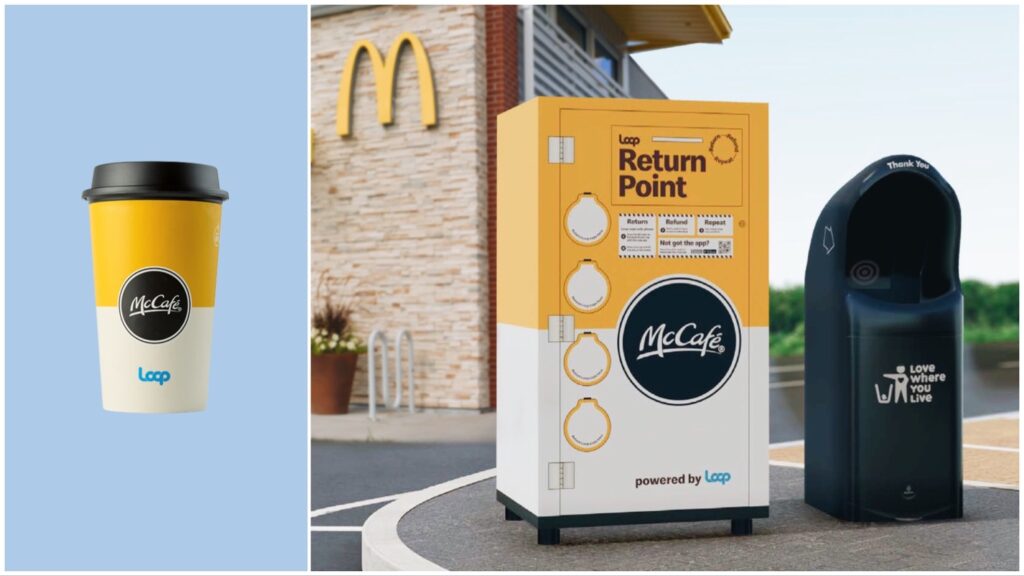In an effort to reduce waste, McDonald’s is rolling out reusable coffee cups.
The American fast-food company recently partnered with Loop, a global reuse platform that replaces single-use packaging with durable designs, to launch the trial program. McDonald’s customers at six restaurants in the Northampton, UK, area will now be able to order their favorite hot drinks in reusable coffee cups in exchange for a £1 deposit.
McDonald’s will also offer participating customers a 20p thank-you in return for reducing the number of single-use containers in circulation. A medium white coffee currently costs just 79p from McDonald’s UK, and visitors will break even after five returns and subsequent orders.
“As a business, McDonald’s is on a journey to revolutionize the way we package products to give customers the sustainable solutions they want,” said Beth Hart, Vice President of Supply Chain and Brand Trust. ”This partnership builds on our packaging and recycling strategy, which switches to more sustainable materials and aims to help our customers to recycle and reuse.”
Customers can place the returnable cups in one of the branded Loop collection bins situated in stores, then local cleaning facilities prepare them for repacking and reuse. Circular&Co, formerly known as rCUP, produces the containers using recycled single-use paper containers. When they finally reach the end of their useful life, the company recycles them once again into new cups.
“Consumers are increasingly asking for more environmentally responsible options,” said Stephen Clarke, Head of Communications for Loop UK. “Which is why Loop is delighted to partner with McDonald’s on this ground-breaking foodservice industry partnership.”
“We hope it paves the way for reusables to become an accessible option for consumers as they enjoy their meal on the go,” he added.
Reusable Coffee Cups: A Sign of Things to Come for McDonald’s?
The circular economy model is becoming more commonplace in the mainstream as large international companies receive increasingly close scrutiny for their astronomical impact on the environment.
Nike, Adidas, Ikea, the North Face, and even fast-food competitor Burger King, have all also trialed similar projects, encompassing everything from sustainably produced clothing and biodegradable running shoes to upcycled furniture and paper packaging.
According to McDonald’s, the company has now saved over 4000 tonnes of plastic per year by removing Happy Meal toys, polymer straws, McFlurry lids, and salad boxes. Today, nearly 90 percent of its packaging comes from recycled or renewable sources.
Despite these improvements, it’s worth noting that McDonald’s—the largest restaurant chain in the world—contributes more than its fair share to pollution and global warming. As per a 2017 report by NGO Zero Waste France (ZWF), the company uses approximately 2.8 tonnes of packaging every single minute. That’s nearly 1.5 million tonnes per year, as reported by Resource.
McDonald’s continues to explore flexitarian menu items made using vegan meat, such as the McPlant in Sweden and Denmark, to help reduce its overall carbon emissions. This is because animal products, and beef in particular, have a disproportionate impact on the environment.
However, the fast-food brand remains one of the single largest buyers of beef products in the world, going through 1.6 billion tonnes of the meat in 2017 alone. Critics maintain that this level of consumption is quite simply unsustainable, no matter how much processes are improved or offset, making any attempts to sell sustainable practices an exercise in greenwashing.
McDonald’s is currently the focus of ongoing protests by Animal Rebellion, which demands that the chain ditches animal products entirely. It also continues to be the subject of broader conversations about worker’s rights and insufficient pay, including zero-hours contracts.


